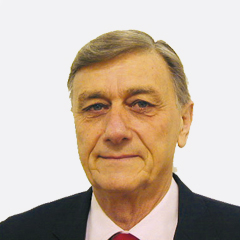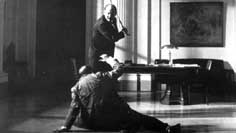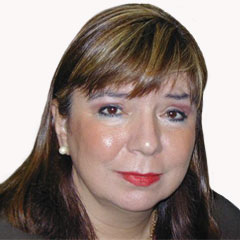
Rosario is the largest city in the central Argentine province of Santa Fe. The city, located 300 km (186 mi) northwest of Buenos Aires on the west bank of the Paraná River, is the third-most populous city in the country, and is also the most populous city in Argentina that is not a capital. With a growing and important metropolitan area, Greater Rosario has an estimated population of 1,750,000 as of 2020. One of its main attractions includes the neoclassical, Art Nouveau, and Art Deco architecture that has been preserved in hundreds of residences, houses and public buildings.

The Democratic Progressive Party is a political party in Argentina, principally active in Santa Fe.

Hermes Juan Binner was an Argentine physician and politician who served as Governor of Santa Fe from 2007 to 2011. Binner was the first Socialist to serve as governor of an Argentine province, and the first non-Peronist to rule Santa Fe since the last transition to democracy in 1983.

Lisandro de la Torre was an Argentine politician, born in Rosario, Santa Fe. He was considered as a model of ethics in politics. He was a national deputy and senator, a prominent polemicist, and founder of the Democratic Progressive Party in 1914. He ran twice for the office of President, in 1916 and in 1931.

Horacio Daniel Usandizaga, also known informally as El Vasco, is an Argentine politician.

This article is about the government of Rosario, the third most populated city in Argentina, and the largest in the province of Santa Fe. Rosario has about 910,000 inhabitants 2001 census [INDEC] and is located on the western shore of the Paraná River.

The Infamous Decade was a period in Argentine history that began with the 1930 coup d'état against President Hipólito Yrigoyen. This decade was marked on one hand by significant rural exodus, with many small rural landowners ruined by the Great Depression, which in turn pushed the country towards import substitution industrialization, and on the other hand, by electoral fraud to perpetuate conservative governments in power. The poor results of economic policies and popular discontent led to another coup in 1943, the Revolution of 1943, by the Grupo de Oficiales Unidos (GOU), a nationalist faction of the Armed Forces, which triggered the rise to power of Juan Perón.

Agustín Oscar Rossi is an Argentine Justicialist Party politician. Rossi has held a number of important political posts throughout his career, most notably as Minister of Defense during the presidencies of Cristina Fernández de Kirchner (2013–2015) and Alberto Fernández (2019–2021).

Servando Bayo was an Argentine politician who served as the National Autonomist Party governor of the province of Santa Fe from April 7, 1874, to April 7, 1878.

Asesinato en el Senado de la Nación is a 1984 Argentine historical crime drama film directed by Juan José Jusid and written by Carlos Somigliana. It stars José Soriano, Miguel Ángel Solá and Oscar Martínez. It premiered on 13 September 1984 in Buenos Aires. Miguel Ángel Solá won Best Actor for his performance at the Havana Film Festival and Jusid won a Golden Colon for his directorship at the Huelva Latin American Film Festival.

Adriana Raquel Bortolozzi de Bogado is an Argentine Justicialist Party politician. She served both as a member of the Argentine Senate and in the Argentine Chamber of Deputies, representing Formosa Province in the majority block of the Front for Victory.

Roxana Itatí Latorre is an Argentine Justicialist Party politician. She was a member of the Argentine Senate representing Santa Fe Province from 2001 to 2015.

The Argentine general election of 1931 was held on 8 November.

General elections were held in Argentina on 2 April 1916. Voters elected the President, legislators, and local officials. The first secret-ballot presidential elections in the nation's history, they were mandatory and had a turnout of 62.8%. The turnout for the Chamber of Deputies election was 65.9%.

Argentine legislative elections of 1912 were held on 7 April 1912 for the Argentine Chamber of Deputies. The first free, democratic elections in the nation's history, the contest had a turnout of 73%.

The Argentine presidential election of 1937 was held on 5 September 1937.

The Argentine Revolution of 1893, or the Radical Revolution of 1893, was a failed insurrection by members of the Radical Civic Union (UCR) against the government of Argentina, then controlled by the National Autonomist Party (PAN). It continued the goals of the Revolution of the Park of 1890, whose themes were further echoed in the Revolution of 1905.

Omar Ángel Perotti is an Argentine accountant and Justicialist Party politician. He was Governor of Santa Fe from 2019 to 2023, National Senator from 2015 to 2019, and from 2011 to 2015 he was a National Deputy, always representing the same province. He was also intendente (mayor) of Rafaela from 1991 to 1995 and again from 2003 to 2011.

Luis Gustavo Contigiani is an Argentine politician who was a National Deputy elected in Santa Fe Province. Politically not affiliated to any party, Contigiani was elected on the Progressive, Civic and Social Front list in 2017, and for a time was the sole representative of the Socialist Party (PS) in the National Congress. The PS barred Contigiani from continuing to be the party's representative due to his opposition to the legalization of abortion in 2018.

María de los Ángeles Sacnun is an Argentine politician who was a National Senator for Santa Fe Province from 2015 to 2021. A member of the Justicialist Party, she was part of the Front for Victory and Frente de Todos parliamentary blocs.





















